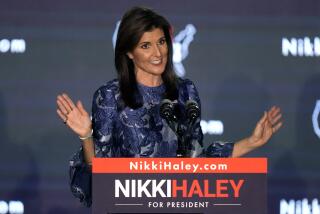Healthcare, for years a political winner for GOP, now powers Democratic wins
The polarizing issue of healthcare, which has dragged down Democrats since passage of the Affordable Care Act in 2010, emerged from Tuesday’s state elections as a potentially formidable new force in the party’s efforts to regain power in next year’s congressional elections.
In Maine, voters resoundingly backed a ballot measure to expand Medicaid through the federal healthcare law, rejecting President Trump’s effort to roll back the law and overriding their Republican governor’s refusal to embrace it.
And worries about healthcare in Virginia helped fuel a solid victory for Democratic gubernatorial candidate Ralph Northam and Democratic legislative candidates across the state. The issue topped voters’ concerns in exit polls Tuesday, with Northam winning a whopping three-quarters of those identifying healthcare as their priority.
“There has been a major change here,” said Robert Blendon, an expert on public opinion about healthcare at Harvard’s Kennedy School. “Democrats for years wouldn’t talk about healthcare. … Now, the implication is that if you are a Democrat running in 2018, you can talk about protecting healthcare for millions of Americans.”
Tuesday’s elections don’t ensure healthcare will remain a winning issue for Democrats in 2018, when party leaders hope they can retake the majority in at least one chamber of Congress.
But the emergence of healthcare as a political liability for Republicans marks a dramatic turnabout for the GOP, which for years reaped huge electoral gains by playing on the unpopularity of the 2010 law.
Tuesday’s results also represent a warning sign for Republicans eager to revive their campaign to repeal the law and its historic coverage expansion.
“In a year when attacks on health and healthcare came from every corner, voters in Maine sent a clear message: Access to healthcare coverage for low-income people should be expanded, not threatened or cut,” said Robert Restuccia, executive director of Community Catalyst, a national patient advocacy group. “We hope that elected officials in Congress and other states will take heed.”
The electoral results will pave the way for Medicaid expansion not only in Maine, but also perhaps in Virginia, where the GOP-controlled state Legislature had blocked expansion there for years. Democrats on Tuesday came close to taking a majority in the state House of Delegates, though final results won’t be known until later this week.
Meanwhile, advocates are eyeing new efforts to force leaders in other states to expand Medicaid eligibility, including in Idaho and Utah.
Thirty-one states and the District of Columbia have expanded eligibility for the government healthcare program since 2014, using federal money made available by the law to cover poor, working-age adults, a population that was historically not eligible for the coverage.
Resistance to the expansion has remained strong in many red states, including most of the South. And the law remains deeply polarizing with Republicans and Democrats still split on its merits.
But the GOP’s effort this year to roll back the law and weaken coverage protections proved even more unpopular. Fewer than 1 in 5 Americans backed the leading Republican repeal bills.
Independent analyses of the GOP repeal bills by the Congressional Budget Office and others estimated they would leave tens of millions more Americans without health coverage and drive up costs for many older and sicker consumers.
That, in turn, has helped shift the healthcare debate nationally. A Pew Research Center poll over the summer found that 60% of Americans believe it is the federal government’s responsibility to ensure all Americans have health coverage — the highest level in nearly a decade.
In Maine, advocates had been working unsuccessfully for years to enact a Medicaid expansion over the fierce opposition of the state’s Republican governor, Paul LePage, a vocal supporter of Trump.
LePage and his allies worked hard to defeat the Medicaid measure. But on Tuesday, the results weren’t even close. The Medicaid measure passed 59% to 41%.
“This should be sending a message to the 18 other states that haven’t yet expanded Medicaid,” Robyn Merrill, executive director of Maine Equal Justice Partners, said a victory speech Tuesday night.
Medicaid wasn’t on the ballot in Virginia, but exit polling suggests the issue had similar resonance there.
Six in 10 voters in Virginia said the state should expand the program, according to a survey by Public Policy Polling conducted for Protect Our Care, an advocacy organization formed to fight the GOP effort to repeal the Affordable Care Act.
At the same time, nearly half of voters said that Republican gubernatorial candidate Ed Gillespie’s support for legislation to repeal the current law made them less likely to back him.
In Washington, those results prompted Democrats to redouble their calls to Republicans to give up the repeal push and work on bipartisan fixes.
“If Republican leaders hadn’t gotten the message, voters made it perfectly clear last night that they reject the deeply harmful partisanship we’ve seen on healthcare,” Washington Sen. Patty Murray, the senior Democrat on the Senate Health Committee, said Wednesday.
Murray and her Republican counterpart, committee Chairman Lamar Alexander of Tennessee, have been urging GOP leaders to bring up a bipartisan bill they developed to stabilize health insurance markets around the country.
The measure has the backing of 60 senators. But Senate Majority Leader Mitch McConnell (R-Ky.) said he won’t hold a vote until Trump indicates he will support the bill.
ALSO
More to Read
Get the L.A. Times Politics newsletter
Deeply reported insights into legislation, politics and policy from Sacramento, Washington and beyond. In your inbox three times per week.
You may occasionally receive promotional content from the Los Angeles Times.







